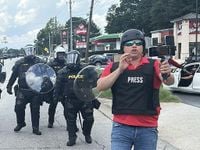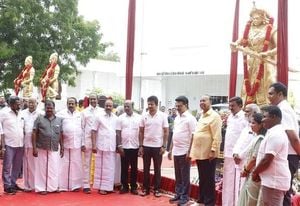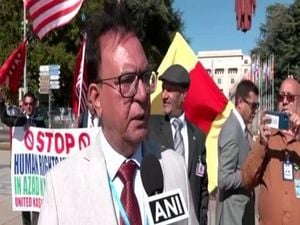Mario Guevara, a prominent Spanish-language journalist based in Atlanta, has spent over two months in federal immigration detention, a case that has ignited fierce debate about press freedom, civil rights, and the growing entanglement between local law enforcement and federal immigration authorities in Georgia. His story is not only about one man’s battle for freedom, but also a window into the broader anxieties facing journalists and immigrant communities in the United States today.
Guevara, 47, was arrested on June 14, 2025, by DeKalb County police while covering a protest known as the “No Kings” rally, which was held in opposition to the Trump administration’s immigration policies. According to the Associated Press, he was livestreaming the demonstration on social media, clearly identifying himself as a member of the press with a bright red shirt and a vest labeled “PRESS.” Moments before his arrest, video footage showed him standing calmly on the sidewalk with other journalists, far from any visible confrontation or chaos.
Police charged Guevara with unlawful assembly, obstruction of police, and being a pedestrian on or along the roadway. However, just eleven days after his arrest, DeKalb County Solicitor-General Donna Coleman-Stribling dismissed all charges, stating that video evidence showed Guevara was “generally in compliance and does not demonstrate the intent to disregard law enforcement directives.”
Despite the dismissal, Guevara’s ordeal was far from over. Instead of being released, he was transferred into the custody of U.S. Immigration and Customs Enforcement (ICE) under the provisions of Georgia’s new immigration law, House Bill 1105, which requires jails to determine the immigration status of detainees suspected of being unauthorized immigrants. This law, passed in 2024, mandates that jails hold such individuals for up to 48 hours so ICE can assume custody, regardless of the severity of the original charges. As Georgia Recorder reports, this law has been criticized for its sweeping reach and for undermining due process.
Within days, the Gwinnett County Sheriff’s Office issued three misdemeanor traffic warrants against Guevara—for distracted driving, failure to obey a traffic control device, and reckless driving. But these charges too were dropped by July 10, 2025, with Solicitor-General Lisamarie Bristol declining to pursue them. Guevara’s lawyers, including representatives from the American Civil Liberties Union (ACLU) of Georgia and the University of Georgia law school’s First Amendment Clinic, argue that the timing of these warrants—issued after Guevara was already in ICE custody—raises serious questions about coordination between local and federal authorities. Attorney Giovanni Diaz remarked, “They may claim they’ve been preparing this information, but the warrants weren’t sworn out until after he was detained and in ICE custody. The timing of it is baffling.”
Since his initial arrest, Guevara has been shuffled through six different detention centers and jails, spending much of his time in solitary confinement, according to his attorneys. He is currently held at the Folkston ICE Processing Center in southeast Georgia, a five-hour drive from his family in suburban Atlanta. His adult son, who suffered a debilitating stroke during surgery in 2021, depends on Guevara as a caretaker. The family has struggled financially since his detention.
Guevara’s legal team filed a petition in federal court on August 20, 2025, arguing that his detention violates his constitutional rights to free speech and due process. The petition alleges that the government is retaliating against Guevara for his reporting, particularly his habit of livestreaming law enforcement activities, including ICE operations and undercover police work. The filing asks the court to order his release “so that he may rejoin his family and community and pursue his constitutionally protected journalistic activities.”
Public records obtained by Georgia Recorder reveal that ICE coordinated closely with the Gwinnett County Sheriff’s Office to build a case against Guevara. On June 18, Assistant Field Office Director Dan Jones of ICE’s Atlanta office emailed the sheriff’s office seeking information to “fight his [Guevara’s] bond request.” The sheriff’s office responded by providing narrative reports that criticized Guevara’s style of reporting, especially his filming of undercover officers and their vehicles. The reports, some documenting activity from as far back as February, described his journalism as “contradicting societal norms.”
ICE used these reports to argue in immigration court that Guevara’s livestreaming of law enforcement activity endangered ongoing investigations and public safety. In response, Guevara’s lawyers countered that filming police in public is legal under both Georgia law and the U.S. Constitution. Nora Benavidez, senior counsel at Free Press and a board member of the Georgia First Amendment Foundation, stated, “In the case of Mario Guevara, filming people in public places has suddenly been recast as illegal interference or surveillance of undercover police activities — this is antithetical to what Georgia law and the U.S. Constitution grant us.”
Despite being granted a $7,500 bond by an immigration judge on July 1, 2025, Guevara remains in custody after ICE filed for an emergency stay, which was granted on July 7. The government’s filings in the case have relied “almost exclusively on Mr. Guevara’s reporting as justification for his continued detention,” according to the court documents. Guevara’s supporters, including the Atlanta Press Club and the Latino Community Fund Georgia, have decried his detention as an attack on democratic norms and a chilling signal to other journalists. Gigi Pedraza, executive director of the Latino Community Fund Georgia, warned, “Once you don’t have due process for someone with a platform as large as Mario, what can we expect for the rest of us?”
Guevara’s career as a journalist spans more than two decades. Fleeing violence and harassment in El Salvador in 2004, he became a respected and sometimes controversial figure in Atlanta’s Hispanic community, first with the newspaper Mundo Hispanico and more recently with his own digital outlet, MG News. With nearly 800,000 followers on Facebook, he has been a bridge between law enforcement and the Spanish-speaking community, reporting on both the impact of immigration raids and crimes within the community. As he said in a 2019 New York Times documentary, “When I have to expose something bad about the authorities, I’ve done it. And when I’ve had to expose something bad about the immigrant community, I have done it as well.”
While ICE has disputed claims that Guevara’s arrest was related to his journalism, the evidence compiled by his legal team and press freedom advocates suggests otherwise. Charles Kuck, an Atlanta-based immigration attorney, observed, “The preparation of such a detailed response reflected here indicates an extraordinary level of hostility to a member of the press.”
As the legal battle continues, Guevara’s case has become a flashpoint in the national conversation about the rights of journalists, the scope of immigration enforcement, and the future of press freedom in America. For now, his fate—and the message it sends to others who dare to document government action—remains uncertain.





